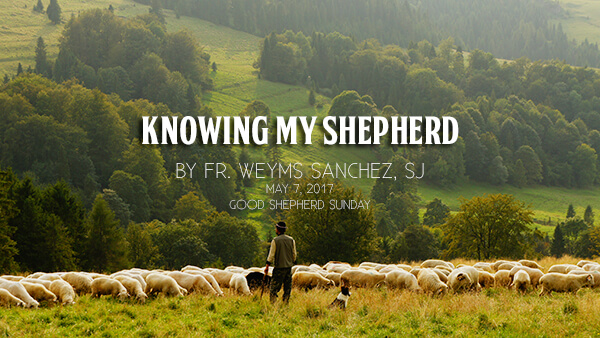


Fr. Weyms Sanchez, SJ
4th Sunday of Easter Good Shepherd Sunday
May 7, 2017
Today, the Fourth Sunday of Easter, is also known as Good Shepherd Sunday. One of the images that Jesus used to describe himself is that of a Good Shepherd, a shepherd who knows his sheep and is willing to lay down his life for his sheep. In Psalm 23, the good shepherd is described as one who keeps his sheep free from want by bringing them to gaze in verdant pastures and to rest beside refreshing waters. He too protects and guides them along the safe and right path.
If Jesus is indeed the Good Shepherd, does it mean that we, his flock are all good sheep? Is a shepherd adjudged good by his effect on his sheep? In one of his parables, Jesus tells the story of a good shepherd who leaves his 99 sheep in order to seek and find the one lost sheep. However, it seems more likely that there are 99 of us who are lost and only one left behind. How many times have we looked elsewhere, rather than the verdant pastures and restful waters to which He leads us, to satisfy our life’s hungers and thirsts? How many times have we refused to follow his cue and instead rely on our own efforts and understanding to give shape and direction to our lives? Indeed, we know ourselves to be wayward sheep. How then can Jesus be called a Good Shepherd?
Religious art has often rendered the Good Shepherd carrying a lamb on his shoulders. Such rendition is explained as the shepherd who has finally found the one lost sheep and is on his way to bring him back to the sheepfold. There is an alternative interpretation of this portrait of the Good Shepherd, one that is, however, said not be actually practiced by shepherds.
They say sheep are short-sighted and can see only as far as six feet. However, they have a very strong sense of smell and keen sense of hearing. Thus, in order not to be lost or left behind, it relies on the movement of the sheep in its vicinity and on the sound of the voice or of the smell of the clothes of its shepherd. Thus, whenever a shepherd has a wayward sheep, he breaks one of its legs so that it could not stray too far from the fold and would be dependent on the shepherd for its food and its mobility. In the morning, the shepherd would carry this sheep from the corral to a safe place, like for example a cave near the grazing field, and spends time with this sheep, lying beside it and talking to it. This makes the sheep grow accustomed to the sound of the shepherd’s voice and to the smell of his body and clothes. And at the end of the day, he once again carries the sheep on his shoulders and brings it back to the corral. And when the leg heals, the shepherd can be confident that the sheep will keep to the flock because it has gotten used to his sound and smell.
A rustic tale this might be perhaps, but the beauty of the story lies in its illustration of what makes a shepherd a good shepherd. It is not merely skill in raising and caring for sheep that makes a shepherd good but in the relationship he nurtures with his sheep. Perhaps, when the psalmist sang the phrase “The Lord is my shepherd,” “my shepherd” did not simply refer to the fact that he had a shepherd but to the deeper and more profound relationship he had with the Good Shepherd.
“I am the good shepherd, and I know mine and mine know me, …. My sheep hear my voice; I know them, and they follow me,” says the Lord. (John 10, 14.27) Too often, we experience a cacophony of voices competing for our attention, for our obedience. And because it is very easy to fall prey to the many noisy and loud voices other than the one true voice of our Good Shepherd, we stray from the fold and get lost in the thickets. And when we feel lost, incapacitated, incapable of carrying on with our lives, let us spend time with the Good Shepherd, listening intently to his voice and accustoming our hearing to his invitation to an ever-deeper relationship with him. For it is only through our obedience and trust that He can be a Good Shepherd to us.
Today is also known as “Vocations Sunday”, a day when our Church prays especially for new shepherds and pastors to lead the Christian communities. If you are interested or someone you know might be interested to be a Jesuit, please contact us at 0917-JESUITS (0917-5378487) or vocations@phjesuits.org.